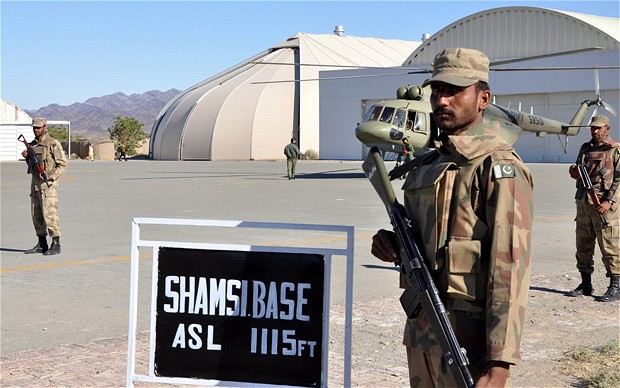
While publicly decrying drone attacks as a violation of sovereignty, Pakistan was secretly cooperating with America’s drone program according to a new report by Greg Miller and Bob Woodward for The Washington Post on Thursday. According to the report, Top Secret documents from the US and Pakistan governments reveal a long and close cooperation between the two countries on the controversial drone program. While much of the Pakistani media has been slow to comment on the details of the report, hyper-nationalists on social media quickly attempted to cast the blame on the civilians who they claimed had manipulated the military and gone against their will. A brief refresher on the history of military and civilian relations, however, shows just how ridiculous an excuse this is.
The first authorisation for US drones strikes in Pakistan came from Gen. Pervez Musharraf who was then ruling the country as a military dictator. According to his interview, the decision was discussed by military and intelligence agencies and given approval by the same.
He said the strikes were discussed “at the military [and] intelligence level” and cleared only if “there was no time for our own [special operations task force] and military to act. That was … maybe two or three times only”.
Drone strikes continued after Musharraf was sent packing by the 2008 elections that brought a PPP-led coalition government to power. Since the civilians had returned to power after that time, many hyper-nationalists and deep state apologists are now trying to pin the blame on the civilians for cooperation with the CIA. Again, this is disproven by the historical record.
Upon taking the reigns of government, one of the first acts of the civilian politicians was to try to bring the ISI out of the shadows and under civilian oversight. In July 2008, Prime Minister Yousaf Gilani announced a decision to move the ISI under the Interior MInistry in “a move seen as asserting civilian authority over the powerful intelligence network”. Barely 6 hours later, however, ISPR declared that no such move would be allowed.
Army spokesman Maj Gen Athar Abbas told the media the army was “not consulted on the notification particularly” about the changes to the ISI, but that “matters for ensuring better coordination between institutions responsible for national security were discussed”.
He said it was “illogical” to place the ISI, which provides “strategic intelligence on external security threats”, under the Interior Ministry which is responsible for internal security.
Two years later, President Zardari was asked about the issue of placing ISI under civilian control and replied that “The political forces want the ISI should be brought under civilian control but for the time being, this matter has been shelved”.
In 2011, Nawaz Sharif said that he also believed the ISI should be brought under civilian control, but months after his party took power earlier this year no change in oversight has been attempted. Speaking at a forum in Indonesia in March, Former DG ISPR and DG (analysis) ISI Major General (R) Athar Abbas stated that the ISI cannot be brought under civilian control.
As controversial as it was at the time, the most honest assessment of the chain of command was probably the Defence Ministry’s reply to the Supreme Court in 2011 that it had no control of Army/ISI operations. Even this was only news to those with short memories – a similar reply had been given to the Sindh High Court by the previous government in 2006.
If the civilians have had no control over Army and ISI operations, then, why would the Americans look to the civilians for authorisation for drone attacks? The wouldn’t. They would do business with those who they knew were in charge of such operations – the Army and ISI.
Even claims against civilians in the Embassy in Washington, DC make little sense once we remember that Pakistan’s Ambassador from 2006 to 2008 was a military man himself, Major General (R) Mahmud Ali Durrani. But even the Ambassador would not be who the American military would turn to for operational coordination; that would be the officers with the defense wing – those rarely seen and even more rarely heard from. As is so often the case, there are suits available to take the heat, but it’s khakis that are actually found in the kitchen.
In response to the Washington Post expose, the Foreign Office reiterated the government’s official position opposing drone strikes, but said he did not want to go “into details” about the facts of the report. Former PM Yousaf Gilani has stated unequivocally that his government gave no authorisation for drone attacks, but that “he didn’t rule out secret deals made without his knowledge”.
He said he could not rule out that the two nations had communicated about planned drone strikes during his tenure. But if they did, he said, the parties involved would have been the CIA and Pakistan’s Inter-
Services Intelligence agency, under conditions set by Pervez Musharraf, the former military ruler.
Since the report was first published by the Washington Post, the only agency that has remained silent is the military. No statement has been issued by ISPR either confirming or denying the allegations.
Opposition figures like Shireen Mazari (PTI) are criticising Prime Minister Nawaz Sharif for not being bold enough in demanding that the Americans end drone attacks during his meeting with US President Barack Obama, but this is politics not policy. The Americans know as well as we do who really holds the authority to say ‘yes’ or ‘no’ to drone strikes, and they’re not talking.
![]()






thst will be NS success if he manage deptts. under constitution ,other wise ,establishment again make conspiracy against NS govt.